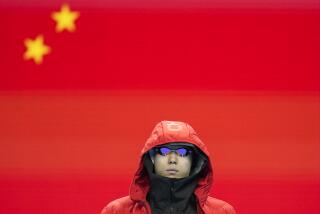IOC Weighs Barring U.S. Track Officials
LAUSANNE, Switzerland â Leaders of the International Olympic Committee said Friday that USA Track & Field officials could be barred from the 2004 Athens Olympics if they do not explain why sprinter Jerome Young was allowed to compete in the 2000 Games after testing positive for steroids.
The IOCâs executive committee decided to consider blocking the officials from attending the Games in an official capacity as the latest in a series of moves designed to ratchet up pressure on USATF. The U.S. Olympic Committee has said it was ready to consider a variety of options, including possible decertification of the organization as the nationâs governing body for track and field.
Young, who won a gold medal as part of the U.S. 1,600-meter relay team, tested positive for the banned steroid nandrolone in 1999. However, a USATF appeals panel cleared him to compete days before the 2000 Olympic trials.
Citing confidentiality concerns, USATF has declined to provide details in the case, including the identification of the athlete. The Times on Aug. 27 identified him as Young, which was later confirmed by the USOC.
IOC President Jacques Rogge said he expects answers from USATF âvery soonâ -- certainly by the next meeting of the IOC board, in Athens in February.
âWe will see what the U.S. track and field federation will do [in response] to our request, and we will handle it accordingly in February, when we know whether we have received the documents or not,â Rogge said at a news conference.
Another key IOC official, Vice President Thomas Bach of Germany, a member of an IOC commission looking into the matter, said denying credentials to USATF officials for the Games was âdefinitely one possibilityâ of âmany.â He declined to elaborate.
Rogge was diplomatic when asked to discuss the IOCâs options: âI think it is not wise in general to start menacing people or organizations. It is far better to see what the situation is. Weâll see in February what we have to do.â
In Sydney, Young ran in the preliminary rounds of the relay, not in the final. But if the IOC determines he was improperly exonerated, it could strip all members of the team of their medals.
A confirmed steroid offense usually results in a two-year ban from competition. Such a penalty would have kept Young out of the Games. Young has said he never committed a doping offense.
A positive steroid test becomes a confirmed âoffenseâ upon review by national and international authorities. The USATF process was conducted in secret, and trackâs worldwide governing body, the International Assn. of Athletics Federations, did not have the chance to review the case before the Sydney Games.
The IOC opened its inquiry Sept. 30 -- about a month after Young was first identified -- noting that the executive board had the power to consider âall possible consequencesâ if it determined USATF had improperly cleared the athlete.
USATF maintains it is bound by an arbitration ruling that said -- before the identity of the athlete became public -- it had reason to maintain confidentiality in doping cases.
âWe share the IOCâs concern that this matter be resolved, especially before the 2004 Olympic Games,â USATF spokeswoman Jill Geer said Friday. âBut weâve done all we can do, legally and otherwise, in this matter.â
Geer added that the arbitration ruling, in USATFâs view, âis binding and prevents us from sharing information.â
Bach disagreed. âI do not think this is right anymore,â he said. Because the identity is known, âitâs a completely different case.â
Rogge added: âWe would want to obtain from the U.S. track federation the documents that are un-redacted. Because today there are inscriptions on the documents, there are names being crossed out. We need for legal reasons the original documents.â
Bach, referring to USATF, said, âIf they would show real goodwill, then they could give us or the IAAF the documentation. The fall back position would be at least that they, with IAAF, enter into a new arbitrationâ asking whether USATF is still bound by the first ruling.
More to Read
Go beyond the scoreboard
Get the latest on L.A.'s teams in the daily Sports Report newsletter.
You may occasionally receive promotional content from the Los Angeles Times.






